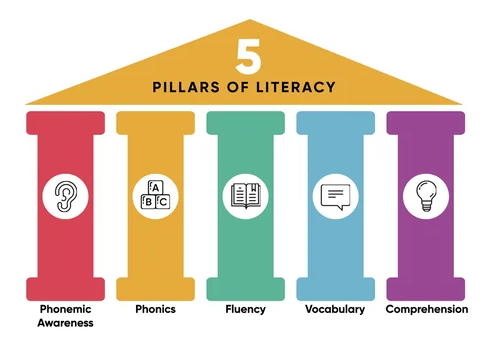Literacy Approach at RVC
Comprehensive Literacy Approach
Literacy begins at home at an early age when parents narrate their days, sing songs, engage in play, and read their children bedtime stories. Schools join in and continue learners' literacy development from the first school day until graduation. Our literacy journeys are deeply personal, individualized, and long. The skills and competencies continue to grow in complexity as we ascend the grades. Each new year and content area provides its rewards and challenges to the learner. Our literacy development continues as we approach work, college, and post-graduate studies.
As educators, knowing the cognitive and neuro-science surrounding how the brain responds to being taught how to read affords us the skillset to make responsive instructional moves to support all learners' language and literacy development. This science further complements academic and growth mindsets.


Over 5 decades of research has indicated that there are 5 main pillars to literacy instruction. This science provides a framework to support teachers and districts in aligning their instruction to sound pedagogical practices for effective literacy development:
New York State has also outlined the lifelong practices of skilled readers and writers. Regardless of grade level, these practices are embedded in daily instruction.
The Rockville Centre School District teachers are committed to supporting their learners in developing as skilled and knowledgeable readers, writers, and communicators. The Kindergarten through 5th grade teachers crafted the literacy vision for the district:
We are all teachers of literacy. Our vision is to support learners in developing a passion for reading and writing by cultivating the skills and dispositions necessary to become effective listeners, speakers, readers, and writers. Our ultimate goal is to empower learners to become independent, productive problem solvers and lifelong learners who can successfully meet the challenges of an ever-changing, diverse, and global society.
We believe:
- All children can learn,
- Learning is a lifelong process,
- Literacy is at the core of all learning, and each component of literacy is equally important,
- Literacy can empower our ability to communicate,
- Differences and successes are celebrated,
- Incorporating learners’ histories, experiences, and identities into reading and writing experiences is crucial,
- Teachers and students together set attainable goals to become proficient, confident learners who perform to their fullest potential.
Cultivating lifelong literacy practices are further fostered through the Approaches to learning. The International Baccalaureate’s Approach to Learning is grounded in the belief that learning how to learn is fundamental to a child’s education. Compared to the science of reading research, cognitive, and neuroscience, the ATLs further complement evidenced-based literacy practices. The document “What is an IB Education?” outlines the ATLS and how they are related to literacy practices:
The five categories of interrelated skills aim to empower students of all ages to become self-regulated learners who know how to ask good questions, set practical goals, pursue their aspirations, and have the determination to achieve them. These skills also help to support students’ sense of agency, encouraging them to see their learning as an active and dynamic process.
The same five categories of skills span all IB programs, with the skills then emphasized in developmentally appropriate ways within each program. The five categories are:
- Thinking skills-including such critical thinking, creative thinking, and ethical thinking
- Research Skills-including skills such as comparing, contrasting, validating, and prioritizing information
- Communication, Including skills such as written and oral communication, effective listening, and formulating arguments
- Social includes forming and maintaining positive relationships, listening skills, and conflict resolution.
- Self-management skills include organizational skills, such as managing time and tasks, and affective skills, such as managing state of mind and motivation.
For further information, a curated list of resources were culled for our community.
We hope you have the opportunity to learn and grow alongside us!